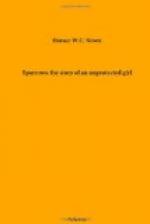Sometimes she would believe that her present visitation of nature was a punishment for her infringement of God’s moral law; whilst at others she would rejoice with a pagan exultation that, whatever the future held in store, she had most gloriously lived in these crowded golden moments which were responsible for her present plight.
Once or twice her distress of mind was such that she could no longer bear the darkness; she would light the candle, when the confinement of the walls, the sight of the orderly and familiar furniture of the room, would suggest an imprisoning environment from which there was no escape. As if to make a desperate effort to free herself, she would jump out of bed, and, throwing the window up, would look out on the night, as if to implore from nature the succour that she failed to get elsewhere. If the night were clear, she would gaze up at the heavens, as if to wrest from its countless eyes some solution of, or, failing that, some sympathy for her extremity of mind. But, for all the eagerness with which her terror-stricken eyes would search the stars, these looked down indifferently, unpityingly, impersonally, as if they were so inured to the sight of sorrow that they were now careless of any pain they witnessed. Then, with a pang at her heart, she would wonder if Perigal were also awake and were thinking of her. She convinced herself again and again that her agonised communing with the night would in some mysterious way affect his heart, to incline it irresistibly to hers, as in those never-to-be-forgotten nights and days at Polperro.
She heard from him fairly regularly, when he wrote letters urging her for his sake to be brave, and telling of the many shocks he had received from the persistent ill luck which he was seeking to overcome. If he had known how eagerly she awaited the familiar writing, how she read and re-read, times without number, every line he wrote, how she treasured the letters, sleeping with them under her pillow at night, he would have surely written with more persistency and at greater length than he did. Occasionally he would enclose money; this she always returned, saying that, as she was now in employment, she had more than enough for her simple needs. Once, after sending back a five-pound note he had sent her, she received a letter by return of post—a letter which gave a death blow to certain hopes she had cherished. She had long debated in her mind if she should apply the gold-mounted dressing case which Windebank had sent her for a wedding present to a purchase very near to her heart. She knew that, if he could know of the purpose to which she contemplated devoting it, and of her straightened circumstances, he would wish her to do as she desired. Having no other money available, she was tempted to sell or pawn the dressing case, to buy with the proceeds a handsome outfit for the expected little life, one that should not be unworthy of a gentlewoman’s child. She felt that, as, owing to the unconventional circumstances




